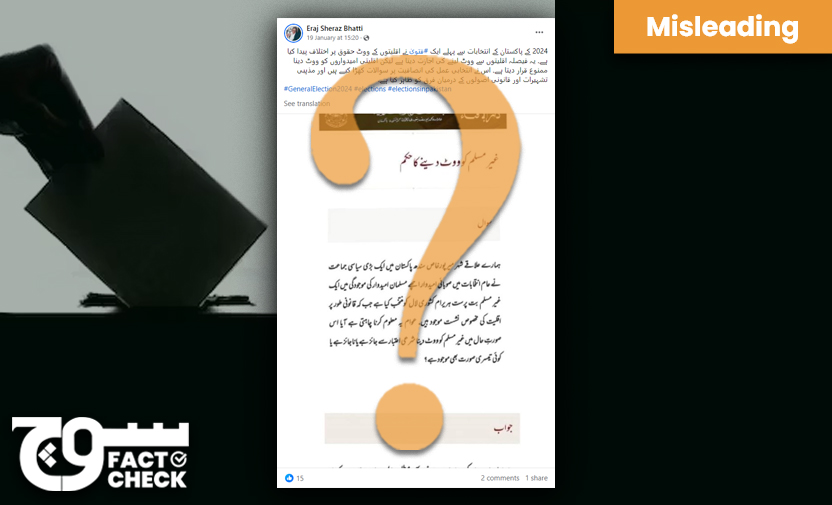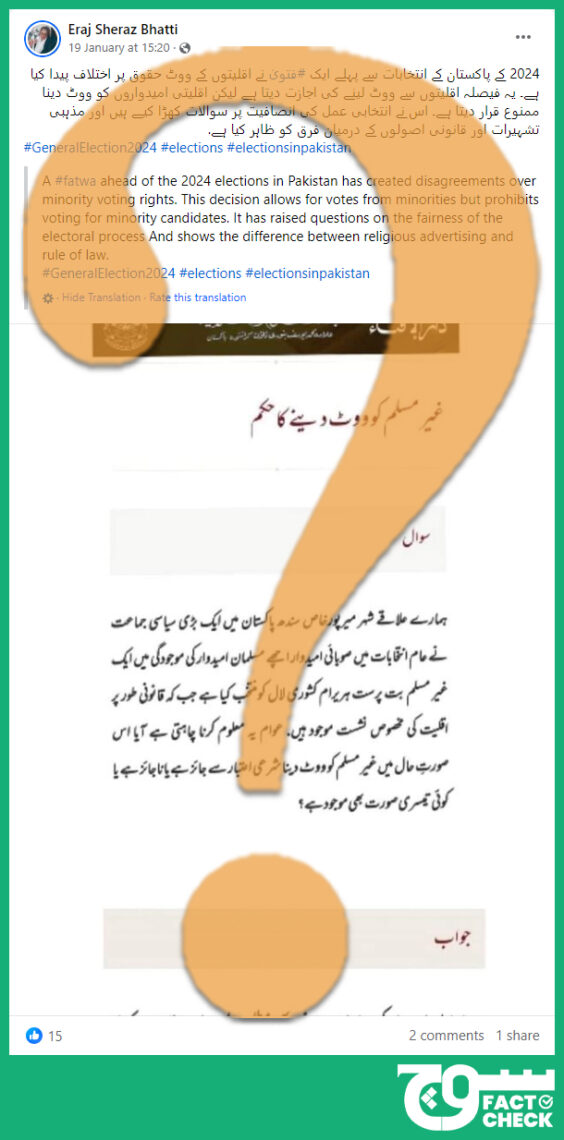
Claim: A fatwa issued ahead of the 2024 general elections in Pakistan advises that it is better to vote for a Muslim candidate than a non-Muslim one.
Fact: The fatwa was not issued recently. It was seemingly issued in 2018 in response to a question about PPP leader Hari Ram Kishori Lal’s candidacy. However, it is important to note that Soch Fact Check has not verified the authority of the fatwa. Given that Islamic decrees are not time-constrained, the fatwa in the claim may still be applicable.
On 21 January 2024, Facebook user Eraj Sheraz Bhatti posted (archive) the screenshot of what she claimed was a recent fatwa — or Islamic decree — released ahead of the upcoming elections, advising that it is better to vote for a Muslim candidate than one who belongs to another religious community.
The text in the screenshot is as follows:
“دار الإفتاء جامعة العلوم الإسلامية
[Dar-ul-Ifta, Islamic University of Science]”
“غیر مسلم کو ووٹ دینے کا حکم
[Guide on voting for a non-Muslim]”
“سوال
[Question]”
“ہمارے علاقے شہر میرپورخاص سندھ پاکستان میں ایک بڑی سیاسی جماعت نے عام انتخابات میں صوباِئی امیدوار اچھے مسلمان امیدوار کی موجودگی میں ایک غیر مسلم بت پرست ہریرام کشوری لال کومنتخب کیا ہے جب کہ قانونی طور پر اقلیت کی مخصوص نشست موجود ہیں۔ عوام یہ معلوم کرنا چاہتی ہے آیا اس صورتِ حال میں غیر مسلم کو ووٹ دینا شرعی اعتبار سے جائز ہےیاناجائز ہے یا کوئی تیسری صورت بھی موجود ہے؟
[In our area — Mirpurkhas, Sindh, Pakistan — a major political party has nominated a non-Muslim idolater as its provincial candidate in the general election, despite there being a good Muslim candidate, while there are legally-reserved minority seats. The public wants to know whether voting for a non-Muslim in this situation is permissible or not, according to Shariah [Islamic law], or is there a third option?]”
“جواب
[Answer]”
“ووٹ ایسےامید وار کو دینا چاہیے جو خود بھی مطلوبہ اہلیت اور صلاحیت رکھتا ہو ، اس کا جماعتی منشور بھی درست ہو اور جس کے متعلق اطمینان ہو کہ وہ اہلِ محلہ کے لیے دینی و دنیوی لحاظ سے بہتر اقدامات کر سکتا ہے۔ اور غیر مسلم امیدوار چوں کہ ان شرائط پر پورا نہیں اترتا؛ اس لیے اُس کے مقابلہ میں کسی مسلمان امید وار کو ووٹ دینا زیادہ بہتر ہے۔ فقط واللہ اعلم
[The vote should be given to a candidate who has the required qualifications and ability, whose party manifesto is also correct, and about whom there is satisfaction that they can take better measures for the people of the neighbourhood in religious and worldly context. And since a non-Muslim candidate does not meet these conditions, it is better to vote for a Muslim candidate. Only God knows better]”
“فتوی نمبر : 143909201460
[Fatwa Number: 143909201460]”
“دارالافتاء : جامعہ علوم اسلامیہ علامہ محمد یوسف بنوری ٹاؤن
[Dar-ul-Ifta: Jamia Uloom Islamiyyah Allama Muhammad Yousuf Banuri Town]”

Bhatti — who describes herself as a Peshawar-based “1st female Christian lawyer” — wrote the following caption:
“2024 کے پاکستان کے انتخابات سے پہلے ایک #فتویٰ نے اقلیتوں کے ووٹ حقوق پر اختلاف پیدا کیا ہے۔ یہ فیصلہ اقلیتوں سے ووٹ لینے کی اجازت دیتا ہے لیکن اقلیتی امیدواروں کو ووٹ دینا ممنوع قرار دیتا ہے۔ اس نے انتخابی عمل کی انصافیت پر سوالات کھڑا کیے ہیں اور مذہبی تشہیرات اور قانونی اصولوں کے درمیان فرق کو ظاہر کیا ہے.
[Ahead of Pakistan’s 2024 elections, a #fatwa has sparked controversy over minority voting rights. The decision allows the taking of votes from minorities but prohibits voting for minority candidates. It has raised questions on the fairness of the electoral process and has shown the difference between religious propaganda and legal principles.]”
The caption includes three hashtags — “#GeneralElection2024,” “#elections,” and “#electionsinpakistan” — referring to the upcoming general elections slated to be held on 8 February 2024 across Pakistan.
Fact or Fiction?
Soch Fact Check looked up “غیر مسلم کو ووٹ دینے کا حکم” [Guide on voting for a non-Muslim] on Google and found the same fatwa (archive) — listed as 143909201460 — on the website of the Jamia Uloom Islamiyyah Allama Muhammad Yousuf Banuri Town or the University of Islamic Studies, colloquially known as Jamia Banuri Town.
Using the ‘page source’ option on Google Chrome, we found that the date the article was published and modified was 24 July 2018.
The URL of the fatwa in question further supports the fact that it was issued in July 2018 as it contains “19-07-2018”, i.e. 19 July 2018. This indicates that the decree was uploaded to the website a few days later on 24 July 2018.
However, we noticed that the latest version of the web page does not include the name of the Hindu candidate — “ہریرام کشوری لال [Hari Ram Kishori Lal]” — in the text of the question put forward to Jamia Banuri Town.
Hari Ram Kishori Lal is a member of the Pakistan People’s Party (PPP), a former Senator and member of the Sindh Assembly, and previously served as Sindh Minister for Food and Minority Affairs. In the 2018 general elections, he won a seat in his hometown Mirpurkhas constituency — officially PS-47 (Mirpurkhas-I).
According to the revised Form 33, for the 2024 general elections, the PPP has once again nominated Hari Ram Kishori Lal from the Mirpurkhas constituency, which is now PS-45, as opposed to PS-47 in 2018.
Soch Fact Check looked up the archived versions of the fatwa on the Jamia Banuri Town website and found one from 15 August 2020. In this version, Hari Ram Kishori Lal’s name has been mentioned in the question, which the fatwa was originally a response to. The availability of the decree’s archived version from 2020 indicates that the seminary removed it from the webpage sometime between 2020 and 2024.
Jamia Banuri Town has provided similar answers on at least two more occasions: in a fatwa listed 143909201263 on 7 July 2018 and another listed 144206200628 on 25 January 2021 wherein it advised against doing anything to facilitate a non-Muslim candidate’s victory.
Jamia Banuri Town has two other pages pertaining to the 2024 general elections; one of them is an article on 2024 general elections and the other — listed 144506102669 and published on 11 January 2024 — is a response to the question “What is the decree on voting for Jamaat-e-Islami?”
Thus, the claim that the fatwa in question is recent and was issued in light of the 2024 general elections in Pakistan is false. However, it is important to reiterate that Islamic decrees are not time-constrained.
Therefore, the aforementioned fatwa is still applicable.
Virality
Soch Fact Check found the claim was shared here and here. It was also shared by Samaj Sewa Foundation CEO and Chairperson Chaman Lal, who included the following phrase in his caption, “Wow, Mr. Qazi, your judgments and hateful fatwas”, likely referring to the Chief Justice of Pakistan (CJP) Justice Qazi Faez Isa.
We also came across multiple reports with misleading headlines — here, here, here, here, here, here, and here — that contain the following paragraph:
“A fatwa — a legal ruling by Islamic scholars — issued by a Karachi-based seminary earlier in the day, regarding minority candidates resurfaced on Facebook and X platforms suggesting voters prefer Muslim candidates over the ones belonging to minorities.”
Conclusion: A fatwa advising that it is better to vote for a Muslim candidate than a non-Muslim one was not issued recently or in light of the upcoming general election of 2024. It was issued in 2018 in response to a question about the PPP leader Hari Ram Kishori Lal’s candidacy.
Background image in cover photo: Element5 Digital
To appeal against our fact-check, please send an email to appeals@sochfactcheck.com
